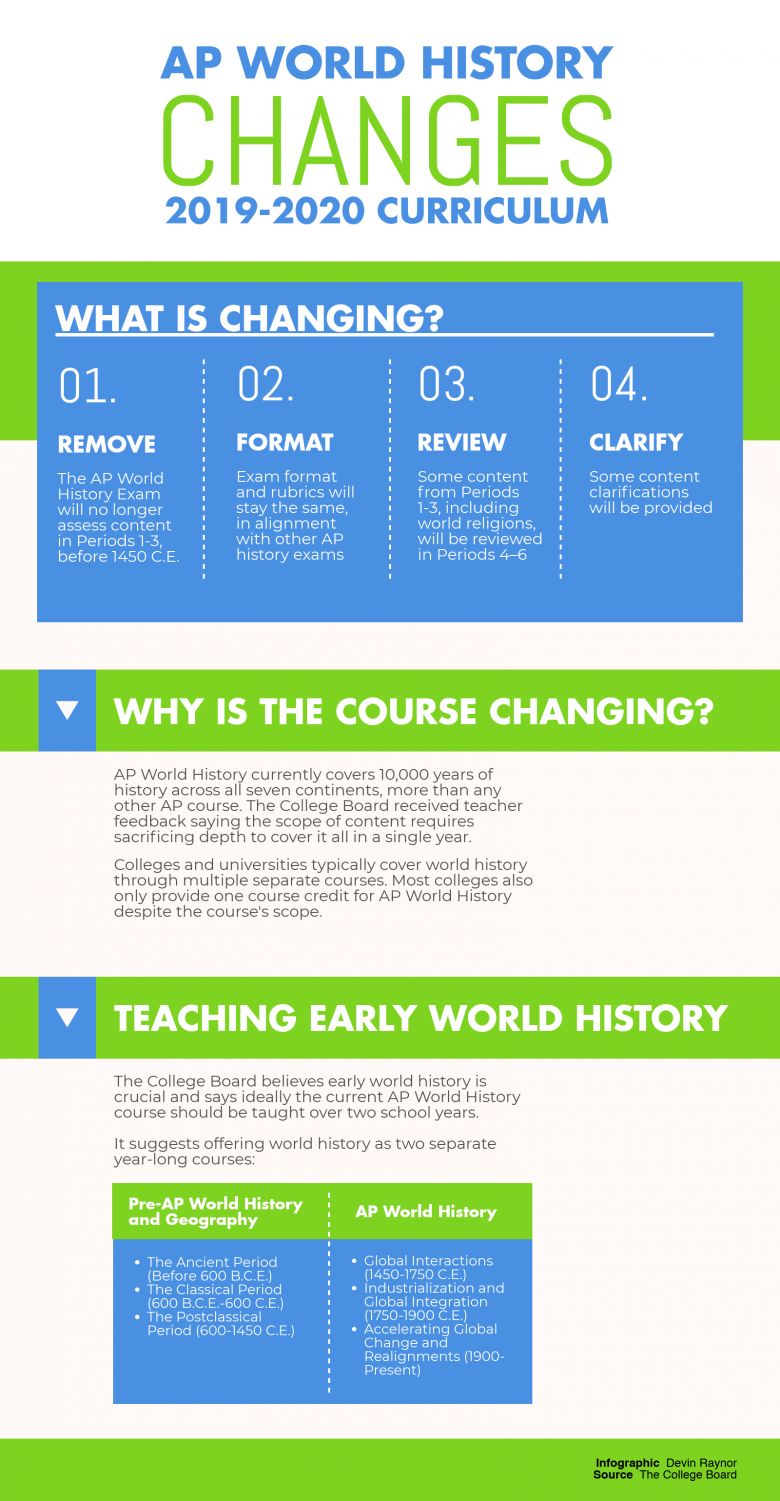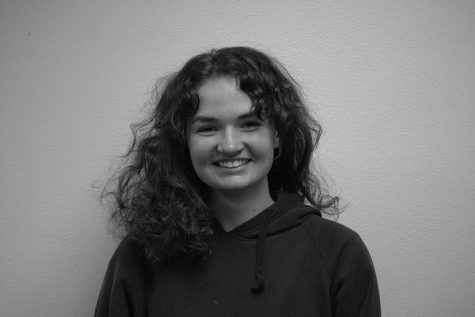First three historical periods to be cut from AP World History
Students petition against changes to 2019-2020 curriculum
Teacher Deb Skadden assists sophomore Isabel Kjaer with an AP World history assignment.
June 4, 2018
Sophomore Euan Lim, who took AP World History this year, said he, as well as other students, recently shared a petition on Facebook advocating to keep the third of three periods the College Board is removing from the course.
“The petition is to keep the College Board from cutting periods one through three from the AP World course,” Lim said. “That would be taking out a lot of the ‘world’ from ‘world history.’”
AP World History teacher Debra Skadden said changes to the 2019-2020 curriculum will remove three periods of history spanning from 10000 B.C.E.-1450 C.E. The course will begin at 1450 C.E., continuing to the present.
According to Skadden, half of the year is usually dedicated to the first three periods. She said removing the third period in particular prevents studying powerful non-European powers.
“The most important part that they’re cutting is 600-1450, because that’s the rise of all of the non-Western civilizations and the greatness of China, the Islamic Empire, the African Kingdoms and Mesoamerican civilizations,” Skadden said.
According to the College Board, the time periods were removed because the class covers a far more expansive time period than other AP courses.

Senior D’aviyan Robinson, who took the course as a sophomore, said she believes the breadth of the course is not reason for changes.
“I feel like that should not be a reason why,” Robinson said. “Just because other courses don’t (cover the same amount of history) doesn’t mean that it’s not important to learn about or that people aren’t interested in learning about it.”
According to Skadden, she will likely have to make major revisions to the class curriculum. She said she hopes the College Board will at least allow the third period to remain in the course.
“The other option is to just keep (teaching periods one to three), to just do it quickly and spend maybe a quarter of the year on it and three quarters of the year on 1450 onward. I haven’t decided yet,” Skadden said.
According to Lim, removing the first three periods of the course would prevent students from learning about non-European cultures prior to colonization.
“The history books usually focus on how the Europeans are going around and conquering the world, colonizing all the other people, killing them and enslaving them. It wouldn’t be about those people’s history before the Europeans came,” Lim said.
Skadden said AP World History differs from other courses because of its scope, and believes changes will make the curriculum too similar to AP European History.
“I’ve been thinking about (changing the way I teach). My initial reaction was ‘well, what’s the point in teaching World History if you’re going to do that?’ You might as well just take AP Euro,” Skadden said.
According to Skadden, she and other AP World History teachers believe because European colonialism began around 1450, the course changes will create a focus on the global impacts of Western Europe.
“The College Board says, or some people say, ‘well, you can still bring in what’s going on in other parts of the world during that time period,’ but what I’ve learned is that what was going on in other parts of the world is a reaction to what the Europeans did,” Skadden said.
Lim said world history courses must focus on history throughout all parts of the world.
“I think that it’s important that world history is about history around the world and not just Europeans. That’s why it’s called world history,” Lim said. “It’s about Asian people and African people and Latin American people and Oceanian people and Native Americans. It’s not just white people killing other people.”
According to Skadden, Park students have previously expressed frustration at exclusion of non-Western history from high school courses.
“Earlier this year during the Black History Month performance, the students were very vocal about how much non-Western history is not covered,” Skadden said. “I think that AP World (currently) is a good option to cover that piece of human history that’s not normally covered in other classes. It’s a different perspective.”
Lim said the change directly opposes statements promoted by Park students and staff as part of this year’s Black History Month show.
“Earlier this year for Black History Month, people went around with those shirts saying ‘black history didn’t start with slavery,’ but if you cut out those other periods out then black history does start with slavery,” Lim said.
According to Skadden, the College Board proposed a Pre-AP World History and Geography course to cover the time periods removed. However, she said the class would not fit into Park’s graduation requirements as a social studies course and has no AP test to provide students with credit.






 just your everyday Managing editor. I’m totally quirky, but now that quirky is trendy I’m an “edgy” quirky...
just your everyday Managing editor. I’m totally quirky, but now that quirky is trendy I’m an “edgy” quirky...